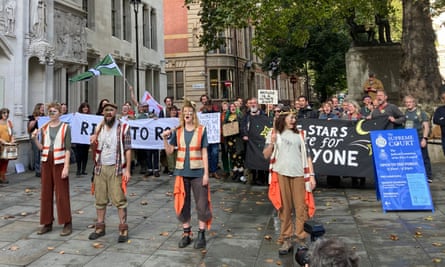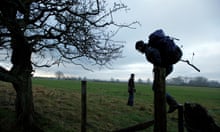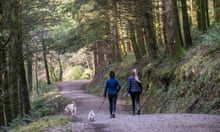Picnicking on Dartmoor is trespassing, according to the lawyers for a landowner who is challenging the right to wild camping on the moors.
The public should have no right to undertake any activities other than walking or horse riding in the Dartmoor national park without landowner permission, Timothy Morshead KC told a supreme court hearing on Tuesday.
He is acting for Alexander Darwall, a multimillionaire hedge fund manager, who has been pursuing the matter through the courts as he does not want people camping on his land without his permission.
Darwall, Dartmoor’s sixth largest landowner, bought the 1,619-hectare (4,000-acre) Blachford estate on southern Dartmoor in 2013. He offers pheasant shoots, deerstalking and holiday rentals on his land.
The argument is over the meaning of the Dartmoor Commons Act, which confers a right to “access to the commons on foot and on horseback for the purpose of open-air recreation”.
Morshead argued this means having a picnic without landowner permission would be trespassing.
Hearing the case, the supreme court judge Lord Stephens asked if this interpretation of the act means you are only allowed to be on foot and on horseback the entire time. Morshead replied: “I am suggesting exactly that,” adding: “Once you’ve started your picnic, you are no longer relying on your right, you are relying on a more informal practice.”
Stephens added: “You’d still be a trespasser and someone could sue you?” To which Morshead said that is “exactly right”.
Stephens interjected: “That is a principle I feel it very difficult to deal with.”
Camping had been assumed to be allowed as a form of “open-air recreation” under the Dartmoor Commons Act since 1985, until a judge ruled otherwise in January 2023. It was the only place in England such an activity was allowed without requiring permission from a landowner. In July of last year, this ruling was overturned in the court of appeal as judges decided wild camping counted as open-air recreation.
In a written submission to the court, the Open Spaces Society warned that agreeing with Darwall’s interpretation of the law would have wide implications for how people enjoy Dartmoor.
They argued: “If camping is excluded from the s.10(1) right, so too would other open-air recreational activities regularly undertaken by those accessing the commons on foot or on horseback. Any activity that is not limited to (or arguably ‘ancillary’ to) walking or horseriding would be prohibited, such as bathing, sketching, rock climbing, bird watching and fishing. While framed as a case about wild camping, the appeal is necessarily about more than that, and has potentially much wider implications for public enjoyment of the Dartmoor commons and other wild spaces.”
after newsletter promotion
Morshead also argued that when drafting the law, legislators could not have intended to give a general right to all kinds of recreation such as camping, because if they had, they would have written a mechanism to compensate landowners for removing their rights over their property. He argued that parliament was not supposed to expropriate rights from landowners without compensation, and this legislation did not offer it.
“If what is potentially unleashed is a general right of recreation, the question of compensation becomes much more acute because you then have unforeseeable implications for land stewardship,” he told the court. “The closer the order gets to the general right of recreation, the larger the question of compensation.”
Stephens interjected: “You still have the right to hold people to account for trespass and fine them?”
But Morshead answered that this was “not realistic”, as landowners often only discovered damage after trespassers have left.

Protesters gathered to play musical instruments and sing songs outside the court for the duration of the hearing.
Before the hearing, Darwall said: “No one is suggesting restricting public access to walk or ride in the national park. But the extent of recreational activity is an important issue if we want to preserve the open moor for the long term.
“Sadly, many campers do not observe the ‘leave no trace’ principle. Campfires on dry ground are dangerous. They also involve habitat destruction, as people break or saw branches from trees and burn them.
“In addition, campers often leave litter and human excrement, which land managers are forced to clear up after them.”
The Labour government has been urged by campaigners to protect the rights of people to wild camp by enshrining it in law across national parks.
Dr Rose O’Neill, the chief executive of the Campaign for National Parks, said: “Whatever the outcome in the supreme court, we need to extend our rights to wild camp across the national parks.
“Seventy-five years ago, an incoming Labour government made radical nature and access laws – hailed as a ‘people’s charter’ – that founded the national parks. This government has promised to mark that anniversary. What better way than renewing the people’s charter, with new rights of access and new powers and resources to enable national parks to thrive.”
A judgment is expected at a later date.










